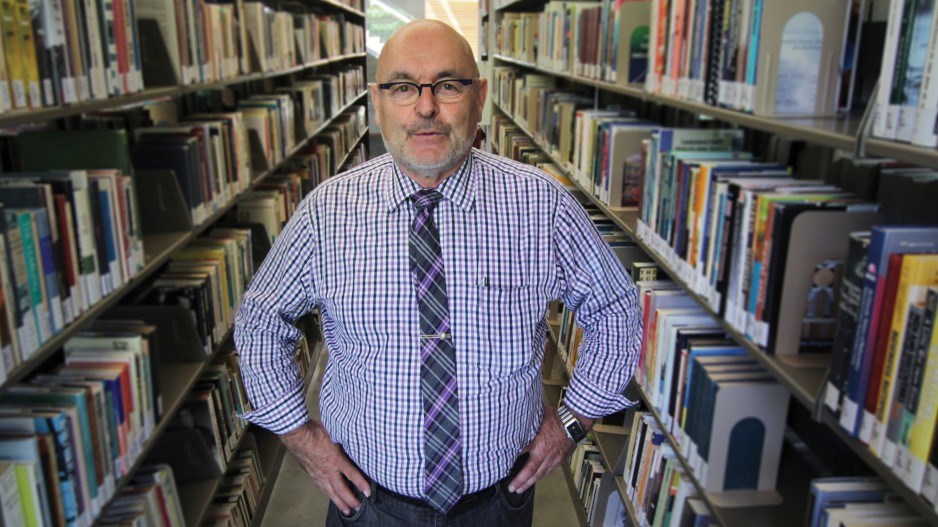According to the Canadian Literacy and Learning Network, 42% of Canadian adults aged 16 to 65 have low literacy skills.
It also reports that fewer than 20% of people with low literacy have regular employment and argues that a 1% increase in Canada’s literacy rate would generate $18 billion in economic growth every year and that investment in literacy programming could have a 241% return on investment.
Wayne Tebb, dean of Kwantlen Polytechnic University’s school of business and one of the original signatories of the Declaration of the Right to Read signed at Stanley House in 1984, said Surrey is particularly vulnerable to low literacy rates given its high percentage of immigrants. New citizens might be fluent in reading and writing in their mother tongue but often lack even basic English skills.
“There are a lot of people arriving in Surrey with lesser levels of education because of this,” Tebb said. “And they’re living in Surrey because housing is available, and it’s still cheaper than anywhere else. And so when you’re going to see a higher concentration of people with literacy challenges, it’s going to make things tougher on everyone.”
A recent survey of more than 100 local employers by the Surrey Local Immigration Partnership, a group made up of local government, businesses and non-profits, found that almost half of those companies (47%) picked poor English skills as the main reason they weren’t hiring new immigrants.
A 2006 Statistics Canada report further outlined this problem, showing that, upon arrival, 74% of immigrants under 14 have no knowledge of English and that 49% of immigrants aged 15 to 24 have no English skills. Tebb said that’s hurting Surrey’s economic opportunities at a time when the city is growing by approximately 1,000 people a month – most of them newly arrived immigrants.
“Some of these people will be able to read, but they won’t be able to read well enough to understand the instructions on a prescription or be able to take down notes on the job site,” he said. “They might not be able to read the instructions on agricultural chemicals and make sure they mix them safely. So there’s a range of issues that are there that definitely have an impact.”
While the area’s large amount of agricultural land helps maintain a relative abundance of available labourer jobs, Tebb said even these positions now require adequate English literacy skills in today’s technologically driven age.
“There was a time when a strong back and a good attitude would keep you in a job,” he said. “But now, if you can’t read, the text message instructions on your phone, the online training, the good host training to work as a waitress, the course for handling industrial chemicals are all now online. A lot of people who are illiterate, [with] this wonderful online world the rest of us can’t get enough of, … are now even more handicapped than before.”
Surrey also has one of Canada’s biggest populations of young people, and many of them arriving as immigrants have few English skills.
Recently Jaswant Bains and Barj Dhahan, who runs the Surrey-based Sandhurst Group of Companies, donated $10,000 through the Rotary Club’s Fraserview chapter toward a multi-year Wonder of Reading literacy partnership with Vancouver’s John Oliver Secondary School.
Dhahan said his mother, who did not go to school in India before immigrating to Canada, spurred him to support raising literacy levels for all children, whether newly arrived immigrants or native English speakers.
“My mother never had the opportunity to attend school in India,” Dhahan said. “In fact, her village did not have an elementary school. But she knew the value of schooling including literacy and numeracy skills. While my four sisters and I were growing up, she would often say to us, ‘Don’t be like me. Work hard. Do well in school. Learn and go to university.’”
Last fall, the Ministry of Advanced Education announced funding for adult literacy programs in 75 communities throughout B.C. totalling $2.4 million.
Michelle Stilwell, social development and social innovation minister and MLA for Parksville-Qualicum, said in the announcement the money is aimed at raising literacy and bringing more people into the workforce.
B.C. is expected to face a serious labour crisis in the coming decades due to an aging population, and new immigrants are seen by many as the best way to fill the gap.
Stilwell said the funding will help approximately 9,500 adult learners gain essential skills.
“Strong reading, writing and math skills are the starting point for many adults looking to upgrade their education, enter skills training programs and secure a good job,” Stilwell said.
The City of Surrey has an adult literacy program through the Progressive Intercultural Community Services Society (PICS), a non-profit organization that helps out with various settlement challenges. Eva Touzard, the community connections coordinator for PICS, said the organization has a special program called the Community Adult Literacy Program, which is designed to help immigrants not only learn English, but also adapt to Canadian culture.
“In this program, we match trained adult volunteers with a learner who has very low to intermediate English language skills,” said Touzard. “In a learner-centred approach, tutors help the learner with reading, writing, communication, basic math and computer skills. When we talk about literacy, we do not only mean reading and writing. These days, people need to use computers, fill on-line forms, job applications and other materials and agreements. Even paying for a parking ticket these days requires a higher level of literacy skills, not to mention social media.”
Touzard said the major challenge is posed by those who come to Canada with low literacy skills to begin with.
“Some communicate well, but are lacking in reading and writing skills while others struggle to acquire English as a second language, especially if they are illiterate in their native country.”




